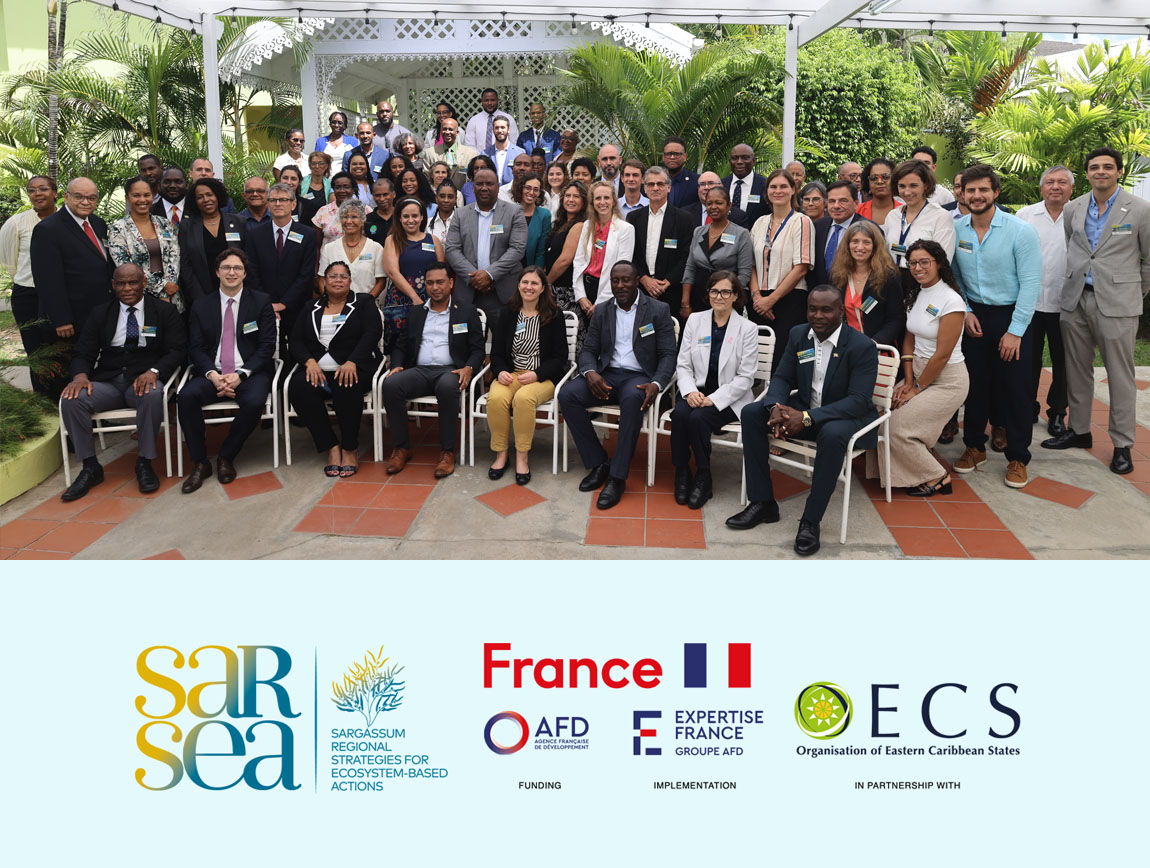Official kickoff of the SARSEA Project: Enhanced Regional Cooperation to tackle the Challenge of Sargassum in the Caribbean
Joint Press Release: Expertise France and the OECS Commission
The Sargassum Regional Strategies for Ecosystem-based Actions (SARSEA) project was officially launched on 28 October in Saint Lucia, in the presence of numerous government, institutional and scientific representatives from across the Caribbean region. Funded by France through the Agence française de développement (AFD) and implemented by Expertise France, in partnership with the Organisation of Eastern Caribbean States (OECS) Commission, the SARSEA project aims to limit the negative impacts of sargassum strandings on the local economy, communities and coastal ecosystems.
A collective commitment to tackle a regional challenge
For several years now, sargassum strandings have been severely affecting Caribbean coastlines, disrupting daily life and the health of populations, as well as marine ecosystems and key economic sectors such as fishing and tourism. In response to this environmental and social threat, the SARSEA project is helping to develop a coordinated regional response based on three main components:
- Strengthen regional cooperation on sargassum planning and management to improve international awareness and policy coordination.
- Support small island states (Commonwealth of Dominica, Grenada, Saint Lucia, St. Vincent and the Grenadines) in implementing integrated initiatives for the management and valorisation of sargassum, promoting a circular and sustainable approach.
- Support regional scientific cooperation to deepen knowledge of the phenomenon, better anticipate its impacts, and guide management strategies.
A fourth cross-cutting theme complements these first three components: the integration of gender considerations into policies and actions related to sargassum management, in order to ensure an inclusive and equitable approach.
The kickoff event focused on dialogue and cooperation
The opening ceremony brought together high-level figures of the region. All affirmed their support to the SARSEA project and their determination to take part in regional efforts to manage sargassum. Among them, H.E. Marie-Noëlle Duris, French Ambassador to the Eastern Caribbean States, Barbados and the OECS, H.E. Arnaud Mentré, Ambassador of France in charge of regional cooperation in the Atlantic zone, as well as key officials from partner countries*.
The Commonwealth of Dominica emphasised the need for a coordinated, scale-based regional approach to sargassum management, noting that each island should play a role in the value chain suited to its capacity and context. Saint Lucia expressed strong commitment to regional cooperation and sustainable solutions, reaffirming its willingness to partner and contribute wherever needed to effectively and collaboratively address the sargassum challenge. Grenada highlighted its priorities of establishing a testing facility, a regional monitoring system, unified collection system, and improved health monitoring.
“For more than a decade, France has been at the forefront of the fight against sargassum, mobilising both the State and local authorities in Guadeloupe, Martinique, and Saint Martin to improve monitoring, collection, and treatment systems. This joint effort, between national institutions and local authorities, has produced valuable expertise that is now being shared regionally, helping to build a coherent and coordinated response across the Eastern Caribbean,” said H.E. Marie-Noëlle Duris, French Ambassador to the Eastern Caribbean States, Barbados and the OECS.
Dr. Didacus Jules, OECS Director General, addressed the gathering through a recorded message. He emphasised the significance of the SARSEA project for the region stating:
“While these four Member States will benefit directly from the project, we are equally committed to using the OECS Commission’s platform to ensure inclusivity and knowledge sharing. Lessons learned, tools developed, and best practices emerging from SARSEA will be disseminated across all twelve Member States, ensuring that every country and territory in our community benefits from this collective effort.”
The official launch was highlighted by the signing of the formal partnership agreement (memorandum of understanding) between the OECS and Expertise France, in the presence of Mathilde De Williencourt, Deputy Director of the Sustainable Development Department at Expertise France, Chamberlain Emmanuel, Head of the OECS Environmental Sustainability Division, and Clara Dufresne, AFD Regional project manager.
Two panel discussions punctuated the morning: firstly, “Shaping the Future of Sustainable Sargassum Management: Partner Country Perspectives,” dedicated to national visions and feedback; and then “Regional Collaboration: Challenges and Opportunities under the SARSEA Project,” focusing on prospects for regional cooperation on sargassum planning and management strategies and at the scientific level.
The afternoon discussions focused on a presentation of the project strategy and a coordination meeting between partners involved in sargassum initiatives in the region.
On October 29, participants also attended the first collective scientific assessment workshop, led by the French National Research Institute for Sustainable Development (IRD).
Building a shared Caribbean strategy
With this official kickoff event, the SARSEA project aims to help consolidate a network of already committed stakeholders, whether public, private, or scientific. By pooling skills, data and best practices, SARSEA will contribute to improving preparedness and response to sargassum strandings, while strengthening the resilience of local areas.
* Hon. Jullan Defoe, Minister of State in Ministry of Agriculture, Fisheries, Blue and Green Economy of the Commonwealth of Dominica; Permanent Secretary Bradley St. Ange, on behalf of Hon. Alfred Prospere, Minister of Agriculture, Fisheries, Food Security and Rural Development of Saint Lucia; Permanent Secretary Javan Williams on behalf of Hon. Lennox Andrews, Minister of Blue Economy and Marine Affairs of Grenada.
Danny Moonie
OECS Communications Unit
